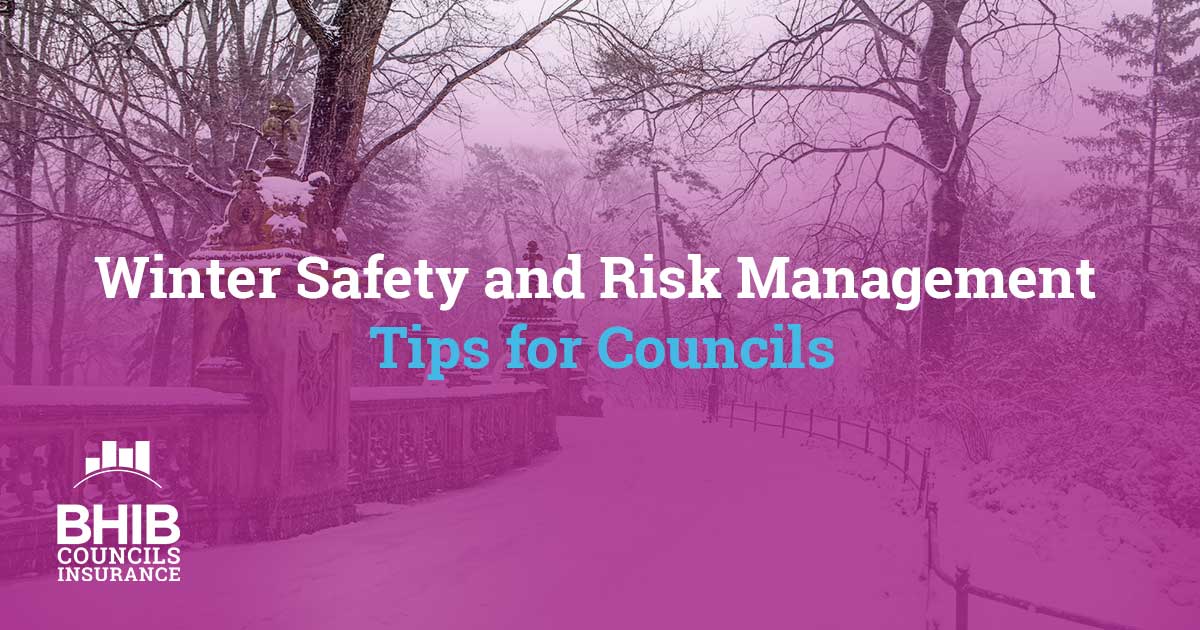With winter well and truly upon us, now is a good time for Parish and Town Councils to prepare for the worsening weather from a safety and risk management perspective.
The winter weather can present a lot of challenges, with roads, car parks, walkways, stairs/steps, bus shelters, playground etc. becoming more hazardous due to ice and snow. Council buildings can also suffer damage during winter – particularly from storms, high winds, floods and icy weather.
To help make sure your Council is well prepared for the various risks that winter weather poses, we have put together the below tips and advice.
If you would like any further information or have any specific questions regarding risk management, please contact us today.
Tips for dealing with winter weather
For any local council, severe weather conditions can have an impact on the ability to deliver services effectively. It can also increase risks regarding the health and safety of employees, contractors, volunteers and members of the public.
Buildings
Rain, snow, ice and wind can all put extra strain on buildings and increase the chances of damage – both externally and internally. During the winter months it is recommended that you increase the frequency of property inspections to make sure there are no problems and to identify any issues early.
You should pay extra attention to the more ‘at-risk’ areas such as roofs, gutters, chimneys and water pipes.
Protect against slips and trips
Less daylight during winter, wet leaves on the ground and the potential for ice patches all contribute to an increased risk of slips and trips. As this risk is foreseeable during the winter months, it is vital that councils take steps to minimise any accidents as much as possible.
The Health and Safety Executive (HSE) provides detailed guidance for reducing the risk of slips and trips in winters, including activities such as removing wet and decaying leaves, providing adequate lighting, dealing with rainwater and gritting key access routes.
Protecting your staff
It is also important to assess how the cold weather might affect your staff – and to take reasonable steps to manage this.
Some extra considerations need to be made for those working outdoors – including those gritting or clearing leaves at your premises. These include:
- Providing suitable personal protective equipment (PPE)
- Providing a warm area for rest breaks
- Ensuring workers have a means of summoning help or assistance if working alone
- Briefing staff on the health effects of working outdoors in cold weather and what symptoms to look out for
Guidance from the HSE is also available to help protect your employees’ when working outdoors.
Tips to help protect buildings from frozen and burst pipes
Frozen pipes are a particular risk in cold temperatures, and an escape of water can cause major damage.
Here are some tips to help protect your buildings from the risk of burst pipes in the colder weather:
- Insulate all pipes in unheated areas like sheds, garages, outbuildings etc.
- If you have thermostatically-controlled heating systems in your buildings, these should be left on permanently on a minimum temperature setting of 4°C
- Turn off the water supplies and drain the pipes in any building that will not be used over the winter months
- Make sure you repair any dripping taps – usually it is as simple as replacing a washer
What to do if you have a burst pipe
If the heating system stops working or makes a loud banging noise then it could be a sign that a pipe is freezing. If that happens you should:
- Turn off the water supply at the main stop tap
- Contact an approved plumbing and heating engineer straight away
- If your pipes freeze over, do not use a naked flame to try and thaw them
Winter Checklist for Councils – top tips for dealing with winter weather
Our free Winter Checklist for Councils can assist you in preparing for bad weather. It is important to periodically review your winter programme to ensure that it is fit for purpose and you are ready to manage the risks ahead.
It is important for town and parish councils to have a thorough winter maintenance programme, which should:
- Include an equipment plan (e.g. shovels for gritting)
- Identify who is responsible for each task
- Detail the follow-up procedures for snow removal
- Layout your communications plans with the wider community
It is also important to regularly review your winter programme to make sure that it evolves with the weather so you are well prepared to manage the risks ahead.
To help with this process, download our free Winter Checklist for Councils now.
Specialist Insurance for Local Councils
We are passionate about delivering tailored insurance solutions for Local Councils.





